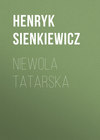Kitabı oku: «The Deluge. Vol. 2», sayfa 23
Indeed the hetman saw a number of tens of men on poor, ragged horses. Babinich's Tartars drove nearly three hundred men with bound hands, beating them with bullock-skin whips. The prisoners presented a terrible sight. They were rather shadows than men. With torn clothing, half naked, so poor that the bones were pushing through their skin, bloody, they marched half alive, indifferent to all things, even to the whistle of the whips which cut them, and to the wild shouts of the Tartars.
"What kind of men are they?" asked the hetman.
"Boguslav's troops!" answered one of Kmita's volunteers who had brought the prisoners together with the Tartars.
"But where did you get so many?"
"Nearly half as many more fell on the road, from exhaustion."
With this an old Tartar, a sergeant in the horde, approached, and beating with the forehead, gave a letter from Kmita to Sapyeha.
The hetman, without delay, broke the seal and began to read aloud: —
"Serene great mighty hetman! If I have sent neither news nor informants with news hitherto, it is because I went in front, and not in the rear of Prince Boguslav's army, and I wished to learn the most possible."
The hetman stopped reading.
"That is a devil!" said he. "Instead of following the prince, he went ahead of him."
"May the bullets strike him!" added Oskyerko, in an undertone.
The hetman read on.
"It was dangerous work, as Boguslav's scouts marched in a wide front; but after I had cut down two parties and spared none. I worked to the van of the army, from which movement great confusion came upon the prince, for he fell to thinking at once that he was surrounded, and as it were was crawling into a trap."
"That is the reason of this unexpected withdrawal!" cried the hetman. "A devil, a genuine devil!" He read on with still more curiosity, —
"The prince, not understanding what had happened, began to lose his head, and sent out party after party, which we cut up notably, so that none of them returned in the same number. Marching in advance, we seized provisions, cut dams, destroyed bridges, so that Boguslav's men advanced with great trouble, neither sleeping nor eating, having rest neither day nor night. They could not stir from the camp, for the Tartars seized the unwary; and when the camp was sleeping, the Tartars howled terribly in the willows; so the enemy, thinking that a great army was moving on them, had to stand under arms all night. The prince was brought to great despair, not knowing what to begin, where to go, how to turn, – for this reason it is needful to march on him quickly, before his fear passes. He had six thousand troops, but has lost nearly a thousand. His horses are dying. His cavalry is good; his infantry is passable; God, however, has granted that from day to day it decreases, and if our army comes up it will fly apart. I seized in Byalystok the prince's carriages, some of his provision chests and things of value, with two cannons; but I was forced to throw most of these into the river. The traitor from continual rage has grown seriously ill, and is barely able to sit on his horse; fever leaves him neither night nor day. Panna Borzobogati is taken, but being ill the prince can make no attack on her honor. These reports, with the account of Boguslav's desperation, I got from the prisoners whom my Tartars touched up with fire, and who if they are touched again will repeat the truth. Now I commend my obedient services to you, serene great mighty hetman, begging for forgiveness if I have erred, the Tartars are good fellows, and seeing a world of plunder, serve marvellously."
"Serene great mighty lord," said Oskyerko, "now you surely regret less that Volodyovski is away, for he could not equal this devil incarnate. Oh, he is an ambitious piece; he even hurled the truth into the eyes of Prince Yanush, not caring whether it was pleasant or unpleasant for that hetman to hear it. This was his style with Hovanski, but Hovanski had fifteen times more troops."
"If that is true, we need to advance at the greatest speed," said Sapyeha.
"Before the prince can collect his wits."
"Let us move on, by the dear God! Babinich will cut the dams, and we will overtake Boguslav!"
Meanwhile the prisoners, whom the Tartars had kept in a group in front of Sapyeha, seeing the hetman, fell to groaning and weeping, showing their misery and calling for mercy in various tongues; for there were among them Swedes, Germans, and the Scottish guards of Prince Boguslav. Sapyeha took them from the Tartars, and gave command to feed them and take their testimony without torture. Their statements confirmed the truth of Kmita's words; therefore the rest of Sapyeha's army advanced at great speed.
CHAPTER XXIV
Kmita's next report came from Sokolka, and was brief:
"The prince, to mislead our troops, has feigned a march toward Shchuchyn, whither he has sent a party. He has gone himself with his main force to Yanov, and has received there a reinforcement of infantry, led by Captain Kyritz, eight hundred good men. From the place where we are the prince's fires are visible. In Yanov he intends to rest one week. The prisoners say that he is ready for battle. The fever is shaking him continually."
On receipt of this statement Sapyeha, leaving the remainder of his cannon and wagons, moved on with cavalry to Sokolka; and at last the two armies stood eye to eye. It was foreseen too that a battle was unavoidable; for on one side they could flee no longer, the others pursuing. Meanwhile, like wrestlers who after a long chase are to seize each other by the bodies, they lay opposite each other, catching breath in their panting throats, and resting.
When the hetman saw Kmita he seized him by the shoulders, and said, —
"I was angry with you for not giving an account of yourself for so long, but I see that you have accomplished more than I could hope for; and if God gives victory, not mine but yours will be the merit. You went like an angel guardian after Boguslav."
An ill-omened light gleamed in Kmita's eyes. "If I am his angel guardian, I must be present at his death."
"God will order that," said the hetman, seriously; "but if you wish the Lord to bless you, then pursue the enemy of the country, not your own."
Kmita bowed in silence; but it could not be learned whether the beautiful words of the hetman made any impression on him. His face expressed implacable hatred, and was the more threatening that the toil of pursuit after Boguslav had emaciated it still more. Formerly in that countenance was depicted only daring and insolent wildness; now it had become also stern and inexorable. You could easily see that he against whom that man had recorded vengeance in his soul ought to guard himself, even if he were Radzivill.
He had, in truth, avenged himself terribly. The services he had rendered in that campaign were immense. By pushing himself in front of Boguslav he had beaten him from the road, had made his reckoning false, had fixed in him the conviction that he was surrounded, and had forced him to retreat. Further he went before him night and day. He destroyed scouting-parties; he was without mercy for prisoners. In Syemyatiche, in Botski, in Orel and Byelsk he had fallen in the dark night on the whole camp.
In Voishki, not far from Zabludovo, in a purely Radzivill country, he had fallen like a blind hurricane on the quarters of the prince himself, so that Boguslav, who had just sat down to dinner, almost fell into his hands; and thanks to Sakovich alone, did he take out his head alive.
At Byalystok Kmita seized the carriages and camp-chests of Boguslav. He wearied, weakened, and inflicted hunger on Boguslav's troops. The choice German infantry and Swedish cavalry which the prince had brought with him were like walking skeletons, from wandering, from surprises, from sleeplessness. The mad howling of the Tartars and Kmita's volunteers was heard in front of them, at the flanks, and in the rear. Scarcely had a wearied soldier closed his eyes when he had to seize his weapons. The farther on, the worse the condition.
The small nobility inhabiting those neighborhoods joined with the Tartars, partly through hatred of the Radzivills of Birji, partly through fear of Kmita; for he punished beyond measure those who resisted. His forces increased therefore; those of Boguslav melted.
Besides, Boguslav himself was really ill; and though in the heart of that man care never had its nest long, and though the astrologers, whom he believed blindly, had foretold him in Prussia that his person would meet no harm in that expedition, his ambition suffered harshly more than once. He, whose name had been repeated with admiration in the Netherlands, on the Rhine, and in France, was beaten every day in those deep forests by an unseen enemy, and overcome without a battle.
There was, besides, in that pursuit such uncommon stubbornness and impetuosity passing the usual measure of war, that Boguslav with his native quickness divined after a few days that some inexorable personal enemy was following him. He learned the name Babinich easily, for the whole neighborhood repeated it; but that name was strange to him. Not less glad would he be to know the person; and on the road in times of pursuit he arranged tens and hundreds of ambushes, – always in vain. Babinich was able to avoid traps, and inflicted defeats where they were least expected.
At last both armies came to the neighborhood of Sokolka. Boguslav found there the reinforcement under Kyritz, who, not knowing hitherto where the prince was, went to Yanov, where the fate of Boguslav's expedition was to be decided.
Kmita closed hermetically all the roads leading from Yanov to Sokolka, Korychyn, Kuznitsa, and Suhovola. The neighboring forests, willow woods, and thickets were occupied by the Tartars. Not a letter could pass; no wagon with provisions could be brought in. Boguslav himself was in a hurry for battle before his last biscuit in Yanov should be eaten.
But as a man of quick wit, trained in every intrigue, he determined to try negotiations first. He did not know yet that Sapyeha in this kind of intrigue surpassed him greatly in reasoning and quickness. From Sokolka then in Boguslav's name came Pan Sakovich, under-chamberlain and starosta of Oshmiana, the attendant and personal friend of Prince Boguslav, with a letter and authority to conclude peace.
This Pan Sakovich was a wealthy man, who reached senatorial dignity later in life, for he became voevoda of Smolensk and treasurer of the Grand Principality; he was at that time one of the most noted cavaliers in Lithuania, famed equally for bravery and beauty. Pan Sakovich was of medium stature; the hair of his head and brows was black as a raven's wing, but he had pale blue eyes which gazed with marvellous and unspeakable insolence, so that Boguslav said of him that he stunned with his eyes as with the back of an axe. He wore foreign garments which he brought from journeys made with Boguslav; he spoke nearly all languages; in battle he rushed into the greatest whirl so madly that among his enemies he was called "the doomed man." But, thanks to his uncommon strength and presence of mind, he always came out unharmed. It was said that he had strength to stop a carriage in its course by seizing the hind wheel; he could drink beyond measure, could toss off a quart of cream in vodka, and be as sober as if he had taken nothing in his mouth. With men he was morose, haughty, offensive; in Boguslav's hand he was as soft as wax. His manners were polished, and though in the king's chambers he knew how to bear himself, he had a certain wildness in his spirit which burst forth at times like a flame.
Pan Sakovich was rather a companion than a servant of Boguslav. Boguslav, who in truth had never loved any one in his life, had an unconquerable weakness for this man. By nature exceedingly sordid, he was generous to Sakovich alone. By his influence he raised him to be under-chamberlain, and had him endowed with the starostaship of Oshmiana. After every battle Boguslav's first question was: "Where is Sakovich? has he met with no harm?" The prince depended greatly on the starosta's counsels, and employed him in war and in negotiations in which the courage and impudence of Sakovich were very effective.
This time he sent him to Sapyeha. But the mission was difficult, – first, because the suspicion might easily fall on the starosta that he had come only to spy out and discover Sapyeha's strength; second, because the envoy had much to ask and nothing to offer.
Happily, Pan Sakovich did not trouble himself with anything. He entered as a victor who comes to dictate terms to the vanquished, and struck Sapyeha with his pale eyes.
Sapyeha smiled when he saw that pride, but half of his smile was compassion. Every man may impose much with daring and impudence, but on people of a certain measure; the hetman was above the measure of Sakovich.
"My master, prince in Birji and Dubinki, commander-in-chief of the armies of his princely highness the elector," said Sakovich, "has sent me with a greeting, and to ask about the health of your worthiness."
"Thank the prince, and say that you saw me well."
Sapyeha took the letter, opened it carelessly enough, read it, and said, —
"Too bad to lose time. I cannot see what the prince wants. Do you surrender, or do you wish to try your fortune?"
Sakovich feigned astonishment.
"Whether we surrender? I think that the prince proposes specially in this letter that you surrender; at least my instructions – "
"Of your instructions we will speak later, my dear Pan Sakovich. We have chased you nearly a hundred and fifty miles, as a hound does a hare. Have you ever heard of a hare proposing to a hound to surrender?"
"We have received reinforcements."
"Von Kyritz, with eight hundred men, and so tired that they will lay down their arms before battle. I will give you Hmelnitski's saying 'There is no time to talk!'"
"The elector with all his power is with us."
"That is well, – I shall not have far to seek him; for I wish to ask him by what right he sends troops into the Commonwealth, of which he is a vassal, and to which he is bound in loyalty."
"The right of the strongest."
"Maybe in Prussia such a right exists, but not with us. But if you are the stronger, take the field."
"The prince would long since have attacked you, were it not for kindred blood."
"I wonder if that is the only hindrance!"
"The prince wonders at the animosity of the Sapyehas against the house of Radzivill, and that your worthiness for private revenge hesitates not to spill the blood of the country."
"Tfu!" cried Kmita, listening behind the hetman's armchair to the conversation.
Pan Sakovich rose, went to Kmita, and struck him with his eyes. But he met his own, or better; and in the eyes of Pan Andrei the starosta found such an answer that he dropped his glance to the floor.
The hetman frowned. "Take your seat, Pan Sakovich. And do you preserve calm" (turning to Kmita). Then he said to Sakovich, —
"Conscience speaks only the truth, but mouths chew it and spit it into the world as calumny. He who with foreign troops attacks a country, inflicts wrong on him who defends it. God hears this, and the heavenly chronicler will inscribe."
"Through hatred of the Sapyehas to the Radzivills was the prince voevoda of Vilna consumed."
"I hate traitors, not the Radzivills; and the best proof of this is that Prince Michael Radzivill is in my camp now. Tell me what is your wish?"
"Your worthiness, I will tell what I have in my heart; he hates who sends secret assassins."
Pan Sapyeha was astonished in his turn.
"I send assassins against Prince Boguslav?"
"That is the case!"
"You have gone mad!"
"The other day they caught, beyond Yanov, a murderer who once made an attack on the life of the prince. Tortures brought him to tell who sent him."
A moment of silence followed; but in that silence Pan Sapyeha heard how Kmita, standing behind him, repeated twice through his set lips, "Woe, woe!"
"God is my judge," answered the hetman, with real senatorial dignity, "that neither to you nor your prince shall I ever justify myself; for you were not made to be my judges. But do you, instead of loitering, tell directly what you have come for, and what conditions your prince offers."
"The prince, my lord, has destroyed Horotkyevich, has defeated Pan Krishtof Sapyeha, taken Tykotsin; therefore he can justly call himself victor, and ask for considerable advantages. But regretting the loss of Christian blood, he desires to return in quiet to Prussia, requiring nothing more than the freedom of leaving his garrisons in the castles. We have also taken prisoners not a few, among whom are distinguished officers, not counting Panna Anusia Borzobogati, who has been sent already to Taurogi. These may be exchanged on equal terms."
"Do not boast of your victories, for my advance guard, led by Pan Babinich here present, pressed you for a hundred and fifty miles; you retreated before it, lost twice as many prisoners as you took previously; you lost wagons, cannon, camp-chests. Your army is fatigued, dropping from hunger, has nothing to eat; you know not whither to turn. You have seen my army; I did not ask to have your eyes bound purposely, that you might know whether you are able to measure forces with us. As to that young lady, she is not under my guardianship, but that of Pan Zamoyski and Princess Griselda Vishnyevetski. The prince will reckon with them if he does her any injustice. But speak with wisdom; otherwise I shall order Pan Babinich to march at once."
Sakovich, instead of answering, turned to Kmita: "Then you are the man who made such onsets on the road? You must have learned your murderous trade under Kmita – "
"Learn on your own skin whether I practised well!"
The hetman again frowned. "You have nothing to do here," said he to Sakovich; "you may go."
"Your worthiness, give me at least a letter."
"Let it be so. Wait at Pan Oskyerko's quarters for a letter."
Hearing this, Pan Oskyerko conducted Sakovich at once to his quarters. The hetman waved his hand as a parting; then he turned to Pan Andrei. "Why did you say 'Woe,' when he spoke of that man whom they seized?" asked he, looking quickly and severely into the eyes of the knight. "Has hatred so deadened your conscience that you really sent a murderer to the prince?"
"By the Most Holy Lady whom I defended, no!" answered Kmita; "not through strange hands did I wish to reach his throat."
"Why did you say 'Woe'? Do you know that man?"
"I know him," answered Kmita, growing pale from emotion and rage. "I sent him from Lvoff to Taurogi – Prince Boguslav took Panna Billevich to Taurogi – I love that lady. We were to marry – I sent that man to get me news of her. She was in such hands – "
"Calm yourself!" said the hetman. "Have you given him any letters?"
"No; she would not read them."
"Why?"
"Boguslav told her that I offered to carry away the king."
"Great are your reasons for hating him."
"True, your worthiness, true."
"Does the prince know that man?"
"He knows him. That is the sergeant Soroka. He helped me to carry off Boguslav."
"I understand," said the hetman; "the vengeance of the prince is awaiting him."
A moment of silence followed.
"The prince is in a trap," said the hetman, after a while; "maybe he will consent to give him up."
"Let your worthiness," said Kmita, "detain Sakovich, and send me to the prince. Perhaps I may rescue Soroka."
"Is his fate such a great question for you?"
"An old soldier, an old servant; he carried me in his arms. A multitude of times he has saved my life. God would punish me were I to abandon him in such straits." And Kmita began to tremble from pity and anxiety.
But the hetman said: "It is no wonder to me that the soldiers love you, for you love them. I will do what I can. I will write to the prince that I will free for him whomsoever he wishes for that soldier, who besides at your command has acted as an innocent agent."
Kmita seized his head: "What does he care for prisoners? he will not let him go for thirty of them."
"Then he will not give him to you; he will even attempt your life."
"He would give him for one, – for Sakovich."
"I cannot imprison Sakovich; he is an envoy."
"Detain him, and I will go with a letter to the prince. Perhaps I shall succeed – God be with him! I will abandon my revenge, if he will give me that soldier."
"Wait," said the hetman; "I can detain Sakovich. Besides that I will write to the prince to send me a safe-conduct without a name."
The hetman began to write at once. An hour later a Cossack was galloping with a letter to Yanov, and toward evening he returned with Boguslav's answer: —
"I send according to request the safe-conduct with which every envoy may return unharmed, though it is a wonder to me that your worthiness should ask for a conduct while you have such a hostage as my servant and friend Pan Sakovich, for whom I have so much love that I would give all the officers in my army for him. It is known also that envoys are not killed, but are usually respected even by wild Tartars with whom your worthiness is making war against my Christian army. Now, guaranteeing the safety of your envoy by my personal princely word, I subscribe myself, etc."
That same evening Kmita took the safe-conduct and went with the two Kyemliches. Pan Sakovich remained in Sokolka as a hostage.










